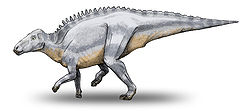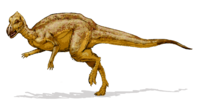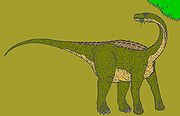
Sânpetru Formation
Encyclopedia
The Sânpetru Formation is a Mesozoic
geologic formation. Dinosaur
remains are among the fossils that have been recovered from the formation. It is located near Sânpetru village, part of Sântămăria-Orlea
commune.
Mesozoic
The Mesozoic era is an interval of geological time from about 250 million years ago to about 65 million years ago. It is often referred to as the age of reptiles because reptiles, namely dinosaurs, were the dominant terrestrial and marine vertebrates of the time...
geologic formation. Dinosaur
Dinosaur
Dinosaurs are a diverse group of animals of the clade and superorder Dinosauria. They were the dominant terrestrial vertebrates for over 160 million years, from the late Triassic period until the end of the Cretaceous , when the Cretaceous–Paleogene extinction event led to the extinction of...
remains are among the fossils that have been recovered from the formation. It is located near Sânpetru village, part of Sântămăria-Orlea
Sântamaria-Orlea
Sântămăria-Orlea is a commune in Hunedoara County, Romania. It is composed of nine villages: Balomir, Bărăştii Haţegului, Bucium-Orlea, Ciopeia, Săcel, Sânpetru, Sântămăria-Orlea, Subcetate and Vadu.-Sânpetru Formation:...
commune.
Ornithischians
| Ornithischians of the Sânpetru Formation | ||||||
|---|---|---|---|---|---|---|
| Genus | Species | Location | Stratigraphic position | Abundance | Notes | Images |
Struthiosaurus Struthiosaurus Struthiosaurus is one of the smallest known and most basal genera of nodosaurid dinosaurs, from the Late Cretaceous period of Austria, Romania and France in Europe. It was protected by body armour... |
S. transylvanicus |
  |
||||
Telmatosaurus Telmatosaurus Telmatosaurus is a genus of basal hadrosaurid dinosaur from the Late Cretaceous. It was a relatively small hadrosaur, approximately five meters long, found in what is now Romania.... |
T. transsylvanicus |
"[Five to ten] fragmentary skulls, some with associated posctrania, mixed age classes." |
||||
Zalmoxes Zalmoxes Zalmoxes is a genus of herbivorous dinosaur from the Late Cretaceous of what is now Romania. It is classified as a rhabdodontid iguanodont.... |
Z. robustus |
|||||
Z. shqiperorum |
||||||
Sauropods
| Sauropods of the Sânpetru Formation | ||||||
|---|---|---|---|---|---|---|
| Genus | Species | Location | Stratigraphic position | Abundance | Notes | Images |
Magyarosaurus Magyarosaurus Magyarosaurus is a genus of dwarf sauropod dinosaur from late Cretaceous Period in what is now Romania. It is one of the smallest-known adult sauropods, measuring only six meters in length. The type species is Magyarosaurus dacus... |
M. dacus |
 |
||||
M. hungaricus |
||||||
M. transsylvanicus |
||||||
Theropods
| Theropods (other than Struthiomimus) reported from the Sânpetru Formation | ||||||
|---|---|---|---|---|---|---|
| Genus | Species | Location | Stratigraphic position | Material | Notes | Images |
Bradycneme Bradycneme Bradycneme is a genus of theropod dinosaur from the early Maastrichtian-age Upper Cretaceous Sânpetru Formation of the Haţeg Basin, Transylvania, Romania. It is known only from a partial right lower leg , which its describers believed came from a giant owl.-History:Harrison and Walker described... |
B. dracullae |
"Distal tibiotarsus." |
 |
|||
Elopteryx Elopteryx Elopteryx is a genus of troodontid maniraptoran theropod dinosaur based on fragmentary fossils found in late Cretaceous Period rocks of Romania. These fossils date from the early-mid Maastrichtian faunal stage, c.71-68 million years ago... |
E. nopcsai |
"Fragmentary femur." |
||||
Euronychodon Euronychodon Euronychodon is the name given to a genus of coelurosaur dinosaur from the Late Cretaceous, described by Miguel Telles Antunes and Denise Sigogneau-Russell in 1991. It is similar to another coelurosaur, Paronychodon.... |
Indeterminate |
|||||
Heptasteornis Heptasteornis Heptasteornis is the name given to a dubious genus of small dinosaur from the Late Cretaceous. The type species is Heptasteornis andrewsi, described as a presumed gigantic prehistoric owl in 1975... |
H. andrewsi |
"Distal tibiotarsus." |
||||
Megalosaurus Megalosaurus Megalosaurus is a genus of large meat-eating theropod dinosaurs of the Middle Jurassic period of Europe... |
M. hungaricus |
"Tooth." |
||||

